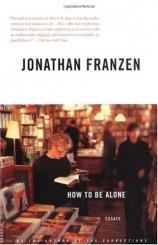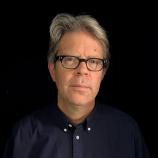How to Be Alone
Review
How to Be Alone
It's been said that a genius is one who can hold two opposing
viewpoints at the same time. Certainly this ability is
characteristic of the best essayists and, in HOW TO BE ALONE,
Jonathan Franzen proves himself a skilled practitioner of the form.
Whether he's working with an idea like privacy, or a fact as
concrete as a federal prison, Franzen considers his subjects from
every angle, holding them up to the light of his wit and erudition
until they sparkle.
Most of the essays are a sublime mix of the personal and the
political. "Sifting the Ashes" examines America's guilty affair
with smoking, not sparing his own nicotine habit. Franzen condemns
the actions of the cigarette companies and the inaction of
government without letting individual smokers off the hook of
ultimate responsibility. On the marketing of cigarettes to teens:
"The truth is that without firm parental guidance teenagers make
all sorts of irrevocable decisions before they're old enough to
appreciate the consequences --- they drop out of school, they get
pregnant, they major in sociology.
"Scavenging" is part an ode to 'making do' with an old black rotary
telephone, but it also pays homage to obsolescence as fodder for
art. "Fiction meant taking up whatever the world had abandoned by
the road and making something beautiful out of it." He proves the
point with his moving essay "My Father's Brain," a narrative of his
father's struggle with Alzheimer's disease, as well as a synopsis
of current scientific research into how we remember and why we
forget.
Franzen, author of THE CORRECTIONS, may be best known to the
general public for being that "ego-blinded snob" who dithered a
little too publicly about the desirability of having that novel
picked for the Oprah Winfrey book club. The theme of elitism runs
strongly through many of the pieces in HOW TO BE ALONE, both as
refuge from and rage against the crassness of modern life. Franzen
has wrestled this angle in all its guises. He recognizes from his
own experience the kinship between the estrangement of depression
and the "aristocracy of alienation" that comprises the elitism of
modern literature.
In his own view, Franzen has mellowed since many of these essays
were written in the mid-'90s. In the foreword, he speaks of
re-reading an essay he wrote in 1996 originally titled "Perchance
to Dream." He was surprised by its stridency. "I used to be the
kind of religious nut who convinces himself that, because the world
doesn't share his particular faith (for me, a faith in literature),
we must be living in the End Times." He did cut the essay by a
quarter but included it in this collection, re-titled "Why Bother."
He may have given up some of his stridency but not the faith.
Is it better to be "right" and alone, or subsumed in the comforting
but shallow embrace of our insatiable mass culture? Judging by
these essays, I think Mr. Franzen is still slightly conflicted and,
as readers, we can rejoice. "With so much fresh outrageousness
being manufactured daily" Franzen's pen will be busy and literature
will be the beneficiary.
Reviewed by Eileen Zimmerman-Nicol on January 22, 2011
How to Be Alone
- Publication Date: October 1, 2003
- Genres: Fiction
- Paperback: 320 pages
- Publisher: Picador
- ISBN-10: 0312422164
- ISBN-13: 9780312422165





